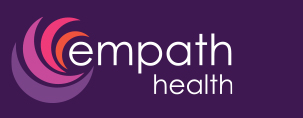 Having end-of-life conversations with your family, loved ones and healthcare providers can be uncomfortable. You may feel like your physicians are giving up hope for a cure or imposing unwanted treatment or recommending withholding care. Waiting until the very end of an illness to have these conversations can make them even more difficult. Empath Health Clinical Practice Specialist Cathy Emmett, PhD, APRN, ACHPN, offers the following suggestions you can use to make these conversations easier and become better prepared in the event you cannot speak for yourself in your wishes for your healthcare.
Having end-of-life conversations with your family, loved ones and healthcare providers can be uncomfortable. You may feel like your physicians are giving up hope for a cure or imposing unwanted treatment or recommending withholding care. Waiting until the very end of an illness to have these conversations can make them even more difficult. Empath Health Clinical Practice Specialist Cathy Emmett, PhD, APRN, ACHPN, offers the following suggestions you can use to make these conversations easier and become better prepared in the event you cannot speak for yourself in your wishes for your healthcare.
One way to decrease this uneasiness is to talk honestly and openly with your family and physician about the care you would like at the end of life. At Empath Health we call them goals-of-care conversations. They help everyone involved in your care understand what is important to you and allows you and your family members not to be caught off guard or unsure of what to do when difficult decisions arise.
This week we mark National Healthcare Decisions Day on April 16 as a time to review, update and talk to those involved in making healthcare decisions for you when you are unable to do so, due to a sudden illness or at the end of long-term terminal illness. Over the past year, the COVID-19 pandemic has shined a light on the importance of these discussions for adults of all ages.
In order to have the most productive goals-of-care conversation consider:
- Creating the right setting to ensure the conversation can be the most productive.
- Ensuring the right people are involved in the conversations: family, close friends, healthcare team.
- Making sure everyone hears the same information if you need to have the conversation more than once.
- Thinking about the way you address those in the conversation. Be clear with your wishes and ask questions of your healthcare team.
- Making a plan with your “team” and make sure it is written down.
- Revisiting and revising the plan as your goals change.
Your goals can change over the course of an illness. Your goal may begin with a cure in mind or an improvement in functionality. As a disease progresses your goals may shift to relieving pain and symptoms and being at home with family and loved ones.
Empath Health offers a variety of resources in English and Spanish that walk you through having end-of-life conversations, picking a healthcare surrogate, tools to record your wishes and goals and more. Having these important conversations early can give you and your loved ones the feel more confident you will be able to live you the end of your life in meaningful ways and on your terms.

Recent Comments